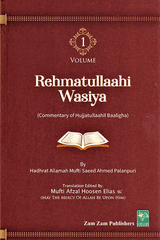



About Hujjat Allah al-Balighah
Hujjat Allah al-Balighah is one of the masterworks of Shah Wali Allah of Delhi, an important Muslim thinker of pre-modern South Asia. This work originally written in Arabic represents a synthesis of the Islamic intellectual disciplines authoritative in the 18th century.
In order to argue for the rational, ethical and spiritual basis for the implementation of the hadith injunctions of the prophet Muhammad, Shah Wali Allah developed a cohesive schema of the metaphysical, psychological, and social knowledge of his time. This work provides an extensive and detailed picture of Muslim theology and interpretive strategies on the eve of the modern period and is still evoked by numerous contemporary Islamic movements.
In this Book Shah Wali Allah discusses matters of belief to social structure, from politics and statecraft to economy, from legal and juristic concepts to philosophical and metaphysical ideas. He addressed himself to the needs of this world but at the same time did not forget to respond to the requirements of ultimate success in the Hereafter.
About Shah Waliullah (R)
Qutb al-Din Ahmad ibn 'Abd al-Rahim, popularly known as Shah Wali Allah, lived at a critical juncture of Muslim history. India had enjoyed the peaceful and prosperous rule of the Mughals for more than 200 years, but by the time of Shah Wali Allah, mutually hostile principalities had begun to emerge. Many of the newly emerging quasi independent states were the result of the rising influence of the militant Maratha, Sikh and Hindu communities and Muslim power and glory in the sub-continent, as in other parts of the world, were gradually eroded. It was at this time of utter despair and despondency for Muslims that Shah Wali Allah was born.
He is among the later scholars who carried the traditions of Al-Ghazzali and Imam Shatibi in combining the essential of Shari'ah, its understanding, development and interpretation to the issues and problems of life. He like Al-Ghazzali took deep stock of Akhira as the explaining point of the relationship between worldly existence and the Hereafter in a meaningful way.
About Hujjat Allah al-Balighah
Hujjat Allah al-Balighah is one of the masterworks of Shah Wali Allah of Delhi, an important Muslim thinker of pre-modern South Asia. This work originally written in Arabic represents a synthesis of the Islamic intellectual disciplines authoritative in the 18th century.
In order to argue for the rational, ethical and spiritual basis for the implementation of the hadith injunctions of the prophet Muhammad, Shah Wali Allah developed a cohesive schema of the metaphysical, psychological, and social knowledge of his time. This work provides an extensive and detailed picture of Muslim theology and interpretive strategies on the eve of the modern period and is still evoked by numerous contemporary Islamic movements.
In this Book Shah Wali Allah discusses matters of belief to social structure, from politics and statecraft to economy, from legal and juristic concepts to philosophical and metaphysical ideas. He addressed himself to the needs of this world but at the same time did not forget to respond to the requirements of ultimate success in the Hereafter.
About Shah Waliullah (R)
Qutb al-Din Ahmad ibn 'Abd al-Rahim, popularly known as Shah Wali Allah, lived at a critical juncture of Muslim history. India had enjoyed the peaceful and prosperous rule of the Mughals for more than 200 years, but by the time of Shah Wali Allah, mutually hostile principalities had begun to emerge. Many of the newly emerging quasi independent states were the result of the rising influence of the militant Maratha, Sikh and Hindu communities and Muslim power and glory in the sub-continent, as in other parts of the world, were gradually eroded. It was at this time of utter despair and despondency for Muslims that Shah Wali Allah was born.
He is among the later scholars who carried the traditions of Al-Ghazzali and Imam Shatibi in combining the essential of Shari'ah, its understanding, development and interpretation to the issues and problems of life. He like Al-Ghazzali took deep stock of Akhira as the explaining point of the relationship between worldly existence and the Hereafter in a meaningful way.
Read more







